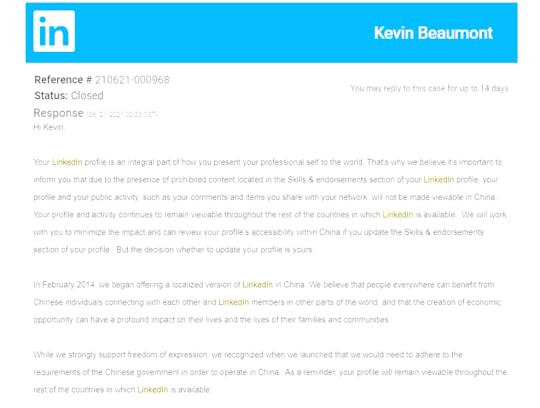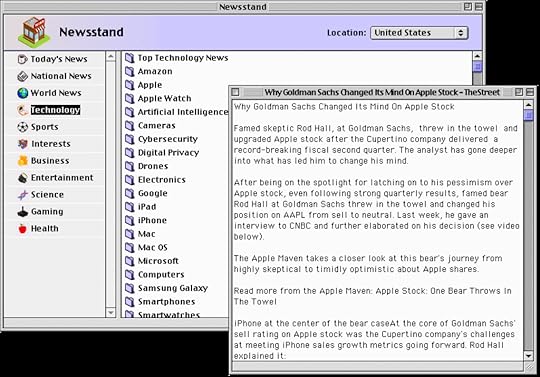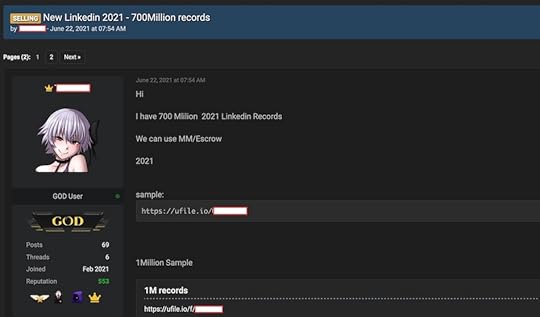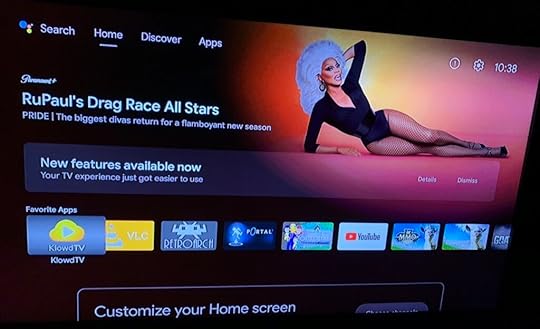Bryan Lunduke's Blog, page 6
July 10, 2021
Red Hat offers burned CentOS users a consolation: two stress balls and a coupon to Applebees
Red Hat announced a series of consolations to Linux users and developers who were hurt by the company’s discontinuing of CentOS, the popular Linux distribution, following their acquisition by IBM.
“We recognize how stressful the loss of CentOS must be,” stated the Red Hat head of Marketing. “So we are sparing no expense and making available to all CentOS users not one, but TWO branded stress balls. They have a penguin on them and everything.”
In addition, Red Hat is providing a coupon good for one free appetizer (with regular entree purchase) from Applebee’s.
“Applebee’s Rib Tips are TOIGHT,” stated former Red Hat CEO (and current IBM President) Jim Whitehurst. “Rib Tips are, like, waaaay better than CentOS. How much barbecue sauce is CentOS slathered in? I’ll tell ya how much. None.”
A fact check of this statement proved that it was true.
CentOS has very little barbecue sauce.
July 9, 2021
GitHub Copilot: The Worst Thing to Ever Happen to Computer Programming
The folks at the GitHub division of Microsoft have released Copilot: a new feature which writes code… so computer programmers don’t have to.
According to Microsoft: “GitHub Copilot is an AI pair programmer that helps you write code faster and with less work. GitHub Copilot draws context from comments and code, and suggests individual lines and whole functions instantly.”
I’m going to be blunt here: This is, quite possibly, the worst idea in the history of computer programming. Ever.

To be fair, from a technical perspective, Copilot is an impressive accomplishment. The sheer amount of data that needed to be collected, indexed, and processed (every line of public code on GitHub)… that’s impressive. The A.I. that predicts the code that it thinks you will need… also incredibly impressive.
Just the same, Copilot is such an astoundingly bad idea — on so many levels — that it is truly baffling that it was created at all. Let’s go over some of the biggest issues with why Copilot is just the worst.
Copilot Problem #1 – Finding and Fixing BugsHypothetical: you decide to build a new piece of software using Copilot as one of your tools.
And let’s assume that Copilot performs its job admirably. Just as intended. Every so often inserting the code you need, exactly when and where you need it. How marvelous! You’ve just cut your total development time significantly!
Right?!
WRONG.
You now have a small mountain of code, that you did not write, interwoven among the code that you wrote yourself.
Who wrote that code? Who knows! It got copied from someone else’s project on GitHub.
Does it have bugs? Probably! Most code does!
Does it have issues interacting with the rest of your code? Possibly? Hard to say! You didn’t actually write it!
When those bugs do crop up… it is now going to be significantly harder to fix as it is code that you are not necessarily at all familiar with.
This is a hard reality of software development. It is almost always easier to read, understand, and fix issues with code that you are already familiar with (especially if you wrote it yourself). If you did not write the code yourself, it is certainly nice to at least know that you can contact the person who did. With Copilot… that’s not possible.
Thus finding — and fixing — bugs is going to be significantly more time consuming and difficult.
Copilot Problem #2 – Programming is Not Data EntryThere is a (relatively profound) misunderstanding among those that are championing Copilot. Something that shows a deep lack of understanding about what computer programming truly is.
Consider this Tweet, for example:

The notion here is that Copilot is a simple tool, for performing repetitive tasks. Tasks that are in no way different if they are performed by a simple tool, or by a human being. Not unlike a calculator, performing some simple equations.
This is utterly preposterous.
Computing programming is a fascinating mixture of engineering and artistry. The number of ways different developers may approach a seemingly simple programming task is nearly limitless. With different benefits (and drawbacks) in a wide variety of ways — including code readability, size, speed, robustness, flexibility, and portability. Just to name a few.
Saying Copilot is to Programming like a Calculator is to Mathematics betrays a deep misunderstanding of at least one of those things.
What if we applied the same technology and approach to writing novels? Taking snippets of other works and inserting them where the AI thinks they should go. The very notion is completely insane.
Copilot Problem #3 – Code BloatReusing self contained code, copied by an AI from an unknown source on GitHub does not lend itself well to lightweight, lean, memory and CPU efficient code.
This is ridiculously obvious.
Copilot Problem #4 – Licensing Troubles (Big Ones)GitHub confirmed, according to one Twitter user, that the code used with Copilot is pulled from ALL public GitHub projects. No matter what the license is.

“All public GitHub code was used in training. We don’t distinguish by license type.”
Meaning, if you use Copilot to insert code into your software, you have absolutely no clue what (or how many) licenses are now involved.
GPL? MIT? Apache? BSD? Probably. Others that are likely incompatible (at least in some way)? Almost assuredly.
Looking to ship your software under a specific license? Maybe even as closed source?
Good-friggin-luck.
Is some of your code, which you hosted on GitHub, now being used in other projects without proper attribution or licensing? Maybe? Who knows!
The legal nightmare that this opens up is of epic proportions. And the problem was so glaringly obvious, that I am at a loss for words as to how the team behind Copilot did not understand and address this from the very moment the idea was first proposed. It’s almost as if the team had never dealt with software licensing.
Copilot should be deletedSome ideas are simply so bad, they should not exist. Copilot is one of those ideas.
It serves to make code slower, bigger, buggier. To, over time, reduce the skills of programmers. And to not only create a maelstrom of software licensing issues… but to deeply disrespect the work for thousands and thousands of programmers.
It may be an impressive accomplishment… but it does far more harm than good.
Is Copilot the worst thing to ever happen to computer programming? That’s a pretty intense statement. If there has been something worse, I can’t think of what it might be. Regardless, one thing is certain…
Microsoft should close it up. Today.
July 6, 2021
Linux Foundation launches Windows-only Game Engine
Continuing their long, clearly intentional march towards making their business about anything and everything except Linux, The Linux Foundation has announced yet another new business: The Open 3D Foundation (along with a corresponding Open 3D Engine).
At first blush, this some sense. Open source 3D game engine! Not the first one, won’t be the last. But another one can’t hurt!
There’s just one teensy, tiny issue…
Open 3D Engine only runs on Windows.
Seriously. Not a joke.
The Linux Foundation now makes a Windows-only 3D game engine. Some folks in Redmond are having a good chuckle over this.
Check out the System Requirements (published by The Linux Foundation):
Open 3D Engine requires Windows 10 64-bit (versions 1809, 10.0.17763 or later)
2.5 GHz quad-core Intel or AMD processor8 GB RAM2 GB VRAM DirectX 12 or Vulkan; 4 GB VRAM recommendedNVIDIA GeForce GTX 1060 with driver version 465.89 or laterAMD Radeon Pro 560 or higher with latest driversIntel HD 630 or higher with latest drivers60 GB of free disk spaceVisual Studio 2019Yeah. You read that right.
Not only is does this new project from The Linux Foundation require Windows 10… it also requires that developers use Microsoft Visual Studio 2019.
Well. Huh.
At least this new business has something to do with computers. Unlike their other recent business: vaccine passports.
July 5, 2021
Microsoft’s LinkedIn says : “Don’t say Tiananmen Square. China doesn’t like it.”
It has been reported that, if you include the phrase “Tiananmen Square” to your LinkedIn profile… you will get censored in China (by LinkedIn and their parent company, Microsoft)… and get sent an email encouraging you to remove the phrase.
Check out this Tweet from Kevin Beaumont, who initially reported this:

A key portion from that email sent by Microsoft / LinkedIn:
“due to the presence of prohibited content” … “your profile and your public activity, such as your comments and items you share with your network, will not be made viewable in China“

The email goes on to encourage the LinkedIn user to remove the reference to “Tiananmen Square” in order to be viewable in China.
“We will work with you to minimize the impact and can review your profile’s accessibility within China if you update the Skills & endorsements section of your profile.”
A USA based computer company is censoring everyone (from any country) if they say “Tiananmen Square”.
Because China doesn’t like it when people say “Tiananmen Square”.
When China says “jump”, Microsoft says “how high?”.
Now, to be fair, while this report has a good amount of supporting evidence — and this action by Microsoft seems somewhat expected — this needs to be confirmed.
With that in mind I have added the phrase “Tiananmen Square” to my LInkedIn profile in multiple places (including in my bio and my skills). What exactly a “Tiananmen Square” skill would be, who knows. But I’m curious to see if that results in me receiving a similar notification from Microsoft.

July 4, 2021
“Lunduke & Friends” is back!
I am joined by the one-and-only Matt Hartley for the triumphant return of Lunduke & Friends!
What do we talk about? WHO KNOWS! It’s a biiiiiiiiig mystery! (But I bet it’s good and nerdy.)
And it’s in video! Beautiful, black & white video!
The only people that get to experience it are Supporters of The Lunduke Journal over at Lunduke.Locals.com.
Who will join Lunduke next week? Who? WHO??!?!?!?
MicroWeb – an (actively developed) DOS Web Browser
Somethings bring joy into the world, simply through the act of existing.
That’s how I feel about MicroWeb.
A web browser… for DOS. Under active development. A friggin’ unicorn.

From the GitHub page:
To run you will need:Intel 8088 or compatible CPUCGA compatible graphics card (EGA and VGA are backwards compatible)A network interface (it is possible to use your machine’s serial port with the EtherSLIP driver)A mouse is desirable but not 100% requiredLimitationsText only (this may change in a later release)HTTP only (no HTTPS support)No CSS or JavascriptVery long pages may be truncated if there is not enough RAM availableThat’s awesome. I mean, yeah. No HTTPS. No Javascript. But. Still. Actively developed. For 8088’s! And CGA! How rad is that?
Google goes to war against “Sideloading”
Over the last few weeks, Apple has engaged in an attack on people being able to install software on their own computers. Apple — along with other companies opposed to humans being able to install software on the computers they own — have chosen to rebrand “installing software” as “Sideloading”.
In case you had any doubt that the other major Operating System companies planned to follow in Apple’s footsteps…
Google has just announced that, as of August of 2021 (read: next month), no applications will be allowed onto the Google Play store in the APK format. Instead all Android applications must be submitted as an “Android Application Bundle“.
Why is this a big deal?
Android Application Bundles (AAB’s) cannot be installed outside of the Google Play Store.
Google is, quite literally, killing off the ability to install software outside of the On-Line store which they have 100% control over. They are locking the platform down in order to restrict your ability to use your computing devices as you see fit.
Note: The phrase “Sideloading” is a dirty tactic, employed by both Apple and Google, to re-frame the simple act of “Installing software on the computer you own” — a basic concept that has always existed in computing — to be a bad, evil, dangerous thing. Don’t let them get away with it. Call them out on this dirty scheme to restrict your freedom.
Mark my words, this is only the beginning. Expect Google, Apple, and others to ramp up their “Sideloading” rhetoric over the coming weeks and months.
June 30, 2021
A new RSS Reader… for MacOS 9!
I love it when people build new software for older computer systems!
Computers are still viable and useful so long as people decide they are. It doesn’t matter how many years have passed since the company (or people) behind the Operating System (or hardware platform) have ceased supporting it. If there are people that use it? It’s still viable!
With that in mind, check out this little bit of sunshine… A brand new, native RSS reading application for MacOS 9!

Newsstand, which is free (as in beer), was developed by Alex Robb… entirely on MacOS 9. Including the website! I love that dedication.
According to the developer, this is what he used to create both the software and the website:
REALbasic 5.5.5 as my software development IDEAcrobat Reader 4.0 to access to the REALbasic User Guide and Language ReferenceAdobe Photoshop 4.0.1 for graphic editing and iconsSimpleText to create the Read Me file and to test font faces and sizesStuffitDeluxe 5.5 to create backups and the expandable archives for the applicationBerkeley Systems’ Expresso Calendar and Address Book for project managementGoLive CyberStudio 1.0 to create this website: http://www.getnewsstand.comFetch 4.0.3 for data transfer to my M1 MacBook Air and to upload the websiteStuffit. Fetch. SimpleText. REALbasic. Man. Those are some blasts from the MacOS past!
And, check this out! System requirements. SANE ONES!
12MB of available RAM2.5MB of available hard disk spaceMac OS 8.1 – 9.2.2.Just glorious.
Huge thanks to Alex Robb for building this and sharing with the world!
June 29, 2021
Massive LinkedIn data breach. Because that is the future we live in.
One week ago — June 22nd, 2021 — a hacker posted the following advertisement:
Hi
I have 700 Million 2021 LinkedIn Records
We can use MM/Escrow
The hacker in question is listed as a “GOD user” on that particular hacker forum, and uses some sort of anime cartoon as an avatar. Because, of course he/she does.

According to a report from RestorePrivacy.com, who examined the sample provided by the hacker/seller, the data contains the following information:
Email AddressesFull namesPhone numbersPhysical addressesGeolocation recordsLinkedIn username and profile URLPersonal and professional experience/backgroundGendersOther social media accounts and usernamesThat’s a lot of personal data. For 700 Million people.
This is the future we live in.The reality is this: There is no way to stop these data breaches and leaks.
It simply is not possible.
The more complex and interconnected (and On-Line accessible) a system is, the more insecure it becomes. That’s simply a fact of basic engineering and there is absolutely no way to stop it.
As points of vulnerabilities and failures grow — such as using cloud hosting providers, centralized authentication systems, and increasingly complex software stacks — the number of such breaches will continue to grow.
Every engineer that has worked in software for more than a decade or two knows this is a fact.
If you have data in any On-Line service… expect it to eventually be sold on the black market, or simply posted online for all to see.
Ain’t the future neat?
June 28, 2021
Nvidia & Google force kids to look at Drag Queens on Shield set top boxes
This month, Nvidia and Google rolled out an update to Nvidia Shield set top boxes.
That update includes advertisements that are forced on users and cannot be disabled or modified.
My kids use our Nvidia Shield to play games and watch a carefully curated collection of movies and TV shows that we own. My wife and I use the Shield to watch family friendly programming.
Now, if my kids want to use the Shield, Nvidia and Google demands that they look at advertisements for drag queens first.

Those drag queen advertisements? They take up roughly 2/3rds of the TV screen.
And, I repeat, Google and Nvidia will not allow them to be disabled or modified. They demand that little kids look at drag queens.
The feature was purposefully developed. The ads curated and served on purpose.
To Google and Nvidia: This is gross. You are gross. Not cool. We have turned off and unplugged the Shield. Maybe, one day, it’ll be safe for families to use. Until then, it’s going in the box of forgotten hardware.
Bryan Lunduke's Blog
- Bryan Lunduke's profile
- 7 followers



